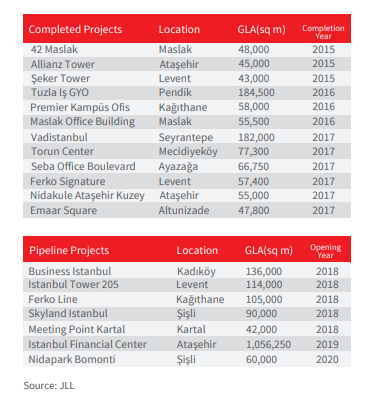Office Market of Turkey, and What Awaits in the Future
Istanbul has become a key player in the global services economy in the past two decades and has picked up the pace since the mid-2000s. A broad range of global firms from sectors such as financial services, IT, media, pharmaceuticals, and FMCG use Istanbul as a regional service hub for large parts of the Middle East, South-East Europe, Central Asia, and increasingly Africa, embracing up to 90 countries. This has boosted the requirement for international-standard office space. In recent years, companies’ office demand toward grade A offices has centered upon two main evaluation criteria - location and physical attributes to attract top talents for their workforce and increase workplace efficiency.

The city aims to be a regional center soon, then it will be a global finance center within the objectives of the plan. As one of the main drivers of the objective, Istanbul International Financial Center is strategically located between the Ataşehir and Ümraniye districts on the Asian side, where it is highly accessible by highways and metro. The project consists of 4.2 million sq m of office, residential, retail, conference, and hotel and was announced in 2009. It has a budget of approximately 1.5 billion USD and will be opened in 2022. Istanbul Financial Center will house the head offices of Turkey’s financial market governing bodies, state-owned and private banks, and related businesses.

The growth of Office Spaces in Istanbul
Istanbul is the most developed office market in Turkey, serving many national and multinational companies. The office market has witnessed a considerable number of leasing transactions above 3,000 sq m since the beginning of 2014.
According to the 2016 Index by REINN, Istanbul's office rental value decreased by 0.34 percent in the upper segment and 0.30 percent in the lower segment compared to the previous quarter. Based on the square meter rent values calculated using the district and neighborhood official borders, Esentepe was the district with the highest rental income. * Esentepe continued to be the region with the highest rent value in the upper price segment with a value of $ 41.50 compared to the square meter value and $ 26.30 in the lower price segment. * In the regions with the lowest rental income, Pendik came to the front with 14,37 dollars in the top price segment and 6,65 dollars in the bottom price segment.
In the market, major transactions were the acquisition of Kristal Tower in 2013 by Finansbank at an estimated price of EUR 230 million, the acquisition of LEED Platinum-certified Rņnesans Tower in 2015 by Allian 7 for EUR 170 million, and the acquisition of a 19,000 sq m office block in the mixed-use project in 2015 by the Azerbaijan oil company SOCAR, which invested USD 63.5 million to move its new office to Seyrantepe upon completion of the project. The Turkish government aims to strengthen the developing office market on the Asian side with the expansion of the financial district. This is one part of the plan that will hopefully ease the burden off European districts like Beşiktaş and Şişli, and create a new main metropolitan center in the process.

Istanbul is home to a broad range of global firms from sectors such as financial services, IT, media, and pharmaceuticals. The megacity is home to more than 5.3 million sq m across 249 Grade A office buildings; in 2020, 7.1 million sq m stock with more than 1.7 million sq m pipeline projects. There were almost 1.2 million sq m take-up transactions in the Office Market since 2012 in Istanbul.
The office market hosts a substantial number of global companies from various sectors. Considering the number of companies and their sectoral diversity, the CBD hosts several global companies across various important sectors. These include banking, insurance, consultancy, computing & technology, Biomed, biotech, and pharmacy.
With plenty of success stories, and a determined plan to transform the city into a business hub, Istanbul is expected to grow above expectations.


